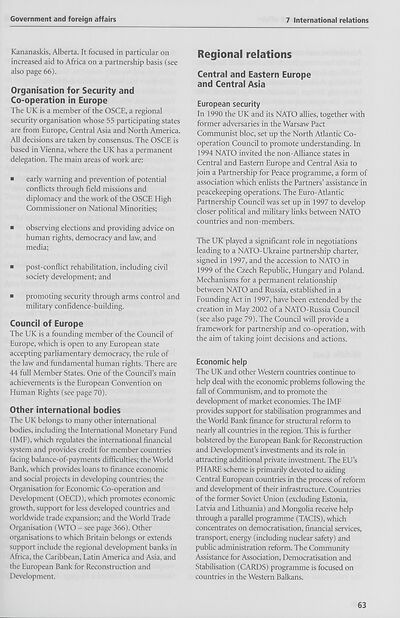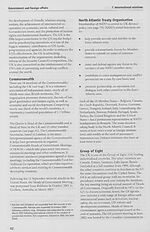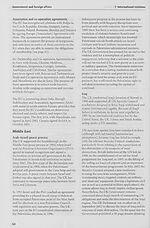Download files
Complete book:
Individual page:
Thumbnail gallery: Grid view | List view

Government and foreign affairs
7 International relations
Kananaskis, Alberta. It focused in particular on
increased aid to Africa on a partnership basis (see
also page 66).
Organisation for Security and
Co-operation in Europe
The UK is a member of the OSCE, a regional
security organisation whose 55 participating states
are from Europe, Central Asia and North America.
All decisions are taken by consensus. The OSCE is
based in Vienna, where the UK has a permanent
delegation. The main areas of work are:
■ early warning and prevention of potential
conflicts through field missions and
diplomacy and the work of the OSCE High
Commissioner on National Minorities;
■ observing elections and providing advice on
human rights, democracy and law, and
media;
■ post-conflict rehabilitation, including civil
society development; and
■ promoting security through arms control and
military confidence-building.
Council of Europe
The UK is a founding member of the Council of
Europe, which is open to any European state
accepting parliamentary democracy, the rule of
the law and fundamental human rights. There are
44 full Member States. One of the Council’s main
achievements is the European Convention on
Human Rights (see page 70).
Other international bodies
The UK belongs to many other international
bodies, including the International Monetary Fund
(IMF), which regulates the international financial
system and provides credit for member countries
facing balance-of-payments difficulties; the World
Bank, which provides loans to finance economic
and social projects in developing countries; the
Organisation for Economic Co-operation and
Development (OECD), which promotes economic
growth, support for less developed countries and
worldwide trade expansion; and the World Trade
Organisation (WTO - see page 366). Other
organisations to which Britain belongs or extends
support include the regional development banks in
Africa, the Caribbean, Latin America and Asia, and
the European Bank for Reconstruction and
Development.
Regional relations
Central and Eastern Europe
and Central Asia
European security
In 1990 the UK and its NATO allies, together with
former adversaries in the Warsaw Pact
Communist bloc, set up the North Atlantic Co¬
operation Council to promote understanding. In
1994 NATO invited the non-Alliance states in
Central and Eastern Europe and Central Asia to
join a Partnership for Peace programme, a form of
association which enlists the Partners’ assistance in
peacekeeping operations. The Euro-Atlantic
Partnership Council was set up in 1997 to develop
closer political and military links between NATO
countries and non-members.
The UK played a significant role in negotiations
leading to a NATO-Ukraine partnership charter,
signed in 1997, and the accession to NATO in
1999 of the Czech Republic, Hungary and Poland.
Mechanisms for a permanent relationship
between NATO and Russia, established in a
Founding Act in 1997, have been extended by the
creation in May 2002 of a NATO-Russia Council
(see also page 79). The Council will provide a
framework for partnership and co-operation, with
the aim of taking joint decisions and actions.
Economic help
The UK and other Western countries continue to
help deal with the economic problems following the
fall of Communism, and to promote the
development of market economies. The IMF
provides support for stabilisation programmes and
the World Bank finance for structural reform to
nearly all countries in the region. This is further
bolstered by the European Bank for Reconstruction
and Development’s investments and its role in
attracting additional private investment. The EU’s
PHARE scheme is primarily devoted to aiding
Central European countries in the process of reform
and development of their infrastructure. Countries
of the former Soviet Union (excluding Estonia,
Latvia and Lithuania) and Mongolia receive help
through a parallel programme (TACIS), which
concentrates on democratisation, financial services,
transport, energy (including nuclear safety) and
public administration reform. The Community
Assistance for Association, Democratisation and
Stabilisation (CARDS) programme is focused on
countries in the Western Balkans.
63
7 International relations
Kananaskis, Alberta. It focused in particular on
increased aid to Africa on a partnership basis (see
also page 66).
Organisation for Security and
Co-operation in Europe
The UK is a member of the OSCE, a regional
security organisation whose 55 participating states
are from Europe, Central Asia and North America.
All decisions are taken by consensus. The OSCE is
based in Vienna, where the UK has a permanent
delegation. The main areas of work are:
■ early warning and prevention of potential
conflicts through field missions and
diplomacy and the work of the OSCE High
Commissioner on National Minorities;
■ observing elections and providing advice on
human rights, democracy and law, and
media;
■ post-conflict rehabilitation, including civil
society development; and
■ promoting security through arms control and
military confidence-building.
Council of Europe
The UK is a founding member of the Council of
Europe, which is open to any European state
accepting parliamentary democracy, the rule of
the law and fundamental human rights. There are
44 full Member States. One of the Council’s main
achievements is the European Convention on
Human Rights (see page 70).
Other international bodies
The UK belongs to many other international
bodies, including the International Monetary Fund
(IMF), which regulates the international financial
system and provides credit for member countries
facing balance-of-payments difficulties; the World
Bank, which provides loans to finance economic
and social projects in developing countries; the
Organisation for Economic Co-operation and
Development (OECD), which promotes economic
growth, support for less developed countries and
worldwide trade expansion; and the World Trade
Organisation (WTO - see page 366). Other
organisations to which Britain belongs or extends
support include the regional development banks in
Africa, the Caribbean, Latin America and Asia, and
the European Bank for Reconstruction and
Development.
Regional relations
Central and Eastern Europe
and Central Asia
European security
In 1990 the UK and its NATO allies, together with
former adversaries in the Warsaw Pact
Communist bloc, set up the North Atlantic Co¬
operation Council to promote understanding. In
1994 NATO invited the non-Alliance states in
Central and Eastern Europe and Central Asia to
join a Partnership for Peace programme, a form of
association which enlists the Partners’ assistance in
peacekeeping operations. The Euro-Atlantic
Partnership Council was set up in 1997 to develop
closer political and military links between NATO
countries and non-members.
The UK played a significant role in negotiations
leading to a NATO-Ukraine partnership charter,
signed in 1997, and the accession to NATO in
1999 of the Czech Republic, Hungary and Poland.
Mechanisms for a permanent relationship
between NATO and Russia, established in a
Founding Act in 1997, have been extended by the
creation in May 2002 of a NATO-Russia Council
(see also page 79). The Council will provide a
framework for partnership and co-operation, with
the aim of taking joint decisions and actions.
Economic help
The UK and other Western countries continue to
help deal with the economic problems following the
fall of Communism, and to promote the
development of market economies. The IMF
provides support for stabilisation programmes and
the World Bank finance for structural reform to
nearly all countries in the region. This is further
bolstered by the European Bank for Reconstruction
and Development’s investments and its role in
attracting additional private investment. The EU’s
PHARE scheme is primarily devoted to aiding
Central European countries in the process of reform
and development of their infrastructure. Countries
of the former Soviet Union (excluding Estonia,
Latvia and Lithuania) and Mongolia receive help
through a parallel programme (TACIS), which
concentrates on democratisation, financial services,
transport, energy (including nuclear safety) and
public administration reform. The Community
Assistance for Association, Democratisation and
Stabilisation (CARDS) programme is focused on
countries in the Western Balkans.
63
Set display mode to:
![]() Universal Viewer |
Universal Viewer | ![]() Mirador |
Large image | Transcription
Mirador |
Large image | Transcription
The item on this page appears courtesy of Office for National Statistics and may be re-used under the Open Government Licence for Public Sector Information.
| Britain and UK handbooks > UK: The official yearbook of the United Kingdom of Great Britain and Northern Ireland > 2003 > (85) |
|---|
| Permanent URL | https://digital.nls.uk/204924212 |
|---|
| Attribution and copyright: |
|
|---|---|
| Description | Three volumes of 'UK: The official yearbook of the United Kingdom of Great Britain and Northern Ireland', published annually by the Office of National Statistics from 2002-2005. |
|---|---|
| Shelfmark | GII.11 SER |
| Description | Three titles produced by the British Government from 1954-2005 describing 'how Britain worked'. They are: 'Britain: An official handbook' (1954-1998), 'Britain: The official yearbook of the United Kingdom' (1999-2001), and 'UK: The official yearbook of the United Kingdom of Great Britain and Northern Ireland' (2002-2005). These 50 reports provide an overview of Britain's economic, social and cultural affairs, its environment, international relations, and the systems of government. They give an impartial summary of government policies and initiatives, and explain how public services are organised. |
|---|---|
| Additional NLS resources: |
|

